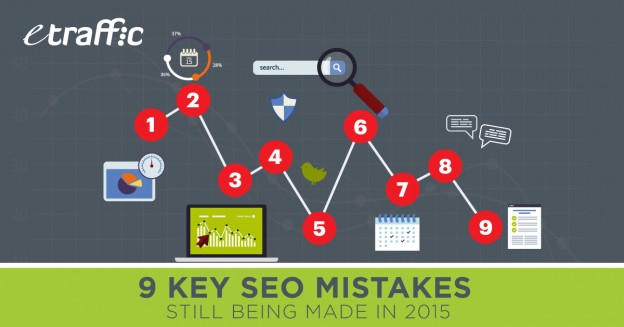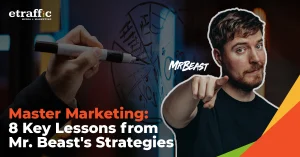![]() Posted by Cameron Francis
on
21 Oct , 2015
in
News Uncategorized
Posted by Cameron Francis
on
21 Oct , 2015
in
News Uncategorized

SEO and online marketing are constantly evolving, with new techniques being developed every year. Despite all that, it seems people are making the same SEO mistakes over and over again.
Why is this so? Well, developing an effective online marketing strategy is a complex undertaking, leaving plenty of room for errors. From favouring link quantity over quality to having a lazy attitude towards meta data, we list the 9 most common SEO mistakes that continue to rear their heads, dividing them between the 2 most critical types – links and content.
4 Linking Mistakes
1. Homepage-Heavy Link Building Strategies
As impressive as a homepage might be, it is not a good idea to focus link building strategies on that page alone. It’s a bit like trying to sell a home by only showing its exterior. The real value is inside. Nobody buys a house without walking through the front door. Don’t get us wrong, links to your homepage should be part of the strategy, but only a small part of it. Take Wikipedia for example. Now ranked the 7th most popular website in the world (6th in US), only 1% of Wikipedia’s links are to its homepage – just 6 million of almost 600 million backlinks. What this shows is that focusing on a deep linking strategy is much more effective.
2. Quitting While You Are Ahead
it might be a wise move at the poker table, but not in SEO. Quitting while you are ahead is tantamount to surrender. Being ranked on the first page is a definite sign that your SEO strategy has been a success. But staying there requires continual effort. It’s not only because your competition is trying to take that place away from you, but with SEO changing constantly, your site needs to have fresh content and links to maintain that prominent ranking position.
3. Overlooking Your Brand Anchor Text
It is no secret that anchor text is important in SEO. Unfortunately, many marketers underestimate their value. There are 2 ways of committing this mistake: firstly, brand anchor texts are not linked to; and secondly, the anchor text never varies. On the limited occasions you do link to your homepage, the brand anchor text is one of the best options to use. Keeping just one anchor text is a poor SEO choice. Google loves diversity. So using variations in the text is a good way of addressing this. Instead of only using ‘high fashion’, use variations like ‘high fashion for women, men and children’.
4. Quantity Over Quality
Websites cannot rank highly on links alone. In fact, having too many links can be counter-productive. Why? Because Google recognises the difference between an earned link and a manipulated link. For example, directory links are a dime a dozen, so they can offer little value. But a link from a high-ranking blog offers a lot of authority. Basically, the high value of your website is confirmed by the authority of those linking to your site. This in turn gives your site a high ranking. It is possible to find out the authority of those incoming links, through tools like SEOQuake. But a as a rule, links from pharmacy or gambling sites are of little help.
4 Content Mistakes
1. Not Choosing The Right Keywords
Keyword phrases are an essential part of SEO. However, not just any keyword will do. Choosing the wrong kind is the surest way of limiting conversion rates. Amongst the most common errors is using global keywords when your services are local, so you’re missing your target audience completely. You should be optimising for local searches. Another is using generic keywords, which (firstly) probably attract people who were never looking for you in the first place, and (secondly) place your site amongst the largest results grouping. Using more specific keyword phrase works better.
2. Turning Your Back On Blogging
Some people believe blogs are dead. In their eyes, visitors are only interested in services, so are never going to click on the blog. But statistics shows that blogging remains hugely important. In September 2015, HubSpot pointed out that “every time you write a blog post, it’s one more indexed page on your website, which means it’s one more opportunity for you to show up in search engines”. Supporting their claim is a link to an earlier post detailing how more Google-indexed pages leads to more leads. The fact that about 70% of their traffic is coming from old blog posts is pretty convincing too.
3. Ignoring Content Relevance
Of course, keeping fresh content flowing is well and good, but it has to be relevant. Remember, content is there to be read, so it needs to engage the readers. Nothing turns readers off more than content that is not relevant to what they are looking for. To ensure relevance, ask yourself these questions:
- Does it fit the website topic?
- Does it add value for the reader?
- Does it fit the keywords I’m using?
- Does it improve the overall quality of the site?
4. Being Lazy About Meta Data
As efficient as it may seem, using the same title tags and meta descriptions on different web pages is actually counter-productive. Giving each page a unique meta data is like giving them unique identities, which will make them more valuable to search engines. Remember what we said about search engines loving variety? So, instead of overusing one tired old phrase in your Meta Title, adapt it to suit each service page. For example, not ‘123 Acme Studios’ for all pages, but ‘SEO Services – 123 Acme Studios’, and ‘Link Building Experts – 123 Acme Studios’. The same principle applies for Meta Descriptions. They need to sell the service being described on the particular web page. And with a limit of only 160 characters, your meta description needs to be concise and direct.
… And One More!
Marketing Is About People
While getting a high search engine ranking is important, real communication with your audience is what truly counts. The visitors to your site are not going to pay the slightest attention to its SEO excellence (or otherwise). They want to be engaged with, feel valued, be informed and, finally, be happy to return to the site again. So, worrying about search engines and forgetting about your site visitors is definitely an SEO mistake that could cost you.
SEO Experts at eTraffic Web Marketing
An SEO campaign can be extremely tedious and complex. So, keeping on top of one is not for the inexperienced. It’s best to turn to online marketing experts who have a track record for SEO success. To find out how eTraffic can help you grow your business, just give us a call on 1300-887-151.






